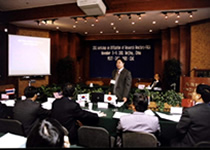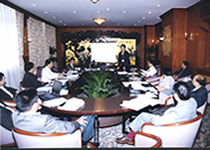MENU

|
| FNCA 2001 Workshop on Research Reactor Utilization |
Workshop-FNCA2001
Nuclear Research Reactor-Powerful Tool
for Variety of Applications We Need
|
| |
|
|
|
Dr. YUAN Luzheng
Professor
CARR Deputy Chief Engineer
Reactor Engin. Research and Design Dept.
China Institute of Atomic Energy |
|
| |
The 2001 FNCA workshop on the utilization
for research reactors was held from Nov. 5-9, Beijing, China. This workshop was sponsored by the Ministry of
Education, Culture, Sports, Science and Technology (MEXT) of Japan and China Atomic Energy Authority (CAEA),
and organized by the Japan Atomic Energy Research Institute (JAERI) and China Institute of Atomic Energy
(CIAE).
Sixty-five participants from eight FNCA members, i.e. Indonesia, Korea, Japan, Malaysia, the Philippines,
Thailand, Vietnam and China attended the workshop. Fifty one papers including two keynote speeches covered
three main themes, namely, neutron scattering study, neutron activation analysis, and radioisotope production
especially 99Mo/99mTc generators, and other synthetic applications of research reactors which are very useful
in industry, agriculture, environment, health and many other fields.
Neutron Scattering Study Neutrons, especially very low velocity neutrons or cold neutrons from nuclear research
reactors, are getting more and more useful to be taken as a tool in study of biology, life science, new
material developing, fundamental research and many other fields. On this workshop, in order to achieve with
socio-economic impacts to end-users, the future activities in neutron scattering were discussed. Information
and results of SANS (small angle neutron scattering) analysis are highly expected to be distributed to all FNCA
participating countries. To facilitate the distribution, mailing list of internet will be established under
the help of JAERI member with the cooperation of all participating countries. |
| |
|
Technical Tour for the site which is
under construction of China Advanced
Research Reactor at CIAE |
|
| |
Neutron Activation Analysis Eleven
country reports and two keynote speeches, one by Dr. Dian Weizhi from CIAE entitled “ On the Position of
Reactor NAA in Contemporary Inorganic Trace Analysis ” and the other by Dr. Mitsuru Ebihara from Tokyo
Metropolitan University titled “Application of Neutron Activation Analysis to Geological Samples”,
were presented in the workshop. The development and application of NAA, in particular the environment
studies such as air pollution study are the common subject and concerns undertaken by the majority of the
participating nations. Latest development of the NAA technique and applications of the technique such as the
Ko method and the utilization in various fields including geological studies were also discussed during the
workshop. The experts of CIAE had convincingly demonstrated the applicability of their Ko method to all
participants. It was agreed that the air pollution study- collection, analysis and data interpretation of the
elemental profile in the air particulate matter-would be adopted as part of the NAA project activities which
will be conducted from January next year to year of 2005.
Tc generators The radioisotope 99Mo production and 99Mo/99mTc generators are of very important application of
research reactors for nuclear medicine. Comparing with the huge demand from hospitals, the radiopharmaceutical
production of 99Mo/99mTc generators is far behind the sufficient supply of 99mTc generators to meet their
domestic demand for all of the participating countries. In such circumstance, the project proposal for
“Establishment and promotion of technology for 99mTc generator production ”presented by Japan was well accepted
by all participants. All countries are willing to provide necessary items for realizing the project and to
establish a network among the FNCA countries to secure the supply of radioisotopes and radiopharmaceuticals
including 99Mo and related materials.
The 2001 FNCA workshop on the utilization of research reactors was successfully held and the cooperative
activities and project programs proposed by this workshop will certainly be strengthened after this workshop. |
|
| |
 |
|
 |
|
| |
Lecture at Plenary Session |
|
Discussion about Neutron Scattering
(Neutron Beam Applications) |
|
|
|
page top↑ |